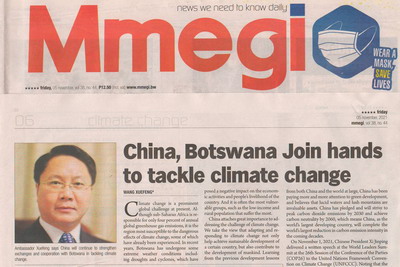On 5th November 2021, Chinese Ambassador H.E. Mr. Wang Xuefeng contributed an article titled China and Botswana Join Hands to Tackle Climate Change to local newspaper the Mmegi. The full text is as follows:

Climate change is a prominent global challenge at present. Although sub-Saharan Africa is responsible for only 4% of annual global greenhouse gas emissions, it is the region most susceptible to the dangerous effects of climate change, some of which have already been experienced. In recent years, Botswana has undergone some extreme weather conditions including droughts and cyclones, which have posed a negative impact on the economic activities and people’s livelihood of the country. And it is often the most vulnerable groups, such as the low-income and rural population, that suffer the most.
China attaches great importance to addressing the challenge of climate change. We take the view that adapting and responding to climate change not only help achieve sustainable development of a certain country, but also contribute to the development of mankind. Learning from the previous development lessons from both China and the world at large, China has been paying more and more attention to green development, and believes that lucid waters and lush mountains are invaluable assets. China has pledged and will strive to peak carbon dioxide emissions by 2030 and achieve carbon neutrality by 2060, which means China, as the world's largest developing country, will complete the world's largest reduction in carbon emission intensity in the coming decades.
On 1st November, Chinese President Xi Jinping delivered a written speech at the World Leaders Summit at the 26th Session of the Conference of the Parties (COP26) to the United Nations Framework Convention on Climate Change (UNFCCC). Noting that the adverse impacts of climate change have become increasingly evident, presenting a growing urgency for global action, President Xi said that how to respond to climate change and revive the world economy are challenges of our times that we must meet. He put forward three proposals in this regard.
First, we need to uphold multilateral consensus. When it comes to global challenges such as climate change, multilateralism is the right prescription. The UNFCCC and its Paris Agreement provide the fundamental legal basis for international cooperation on climate. Parties need to build on existing consensus, increase mutual trust, step up cooperation and work together to deliver a successful COP26 in Glasgow.
Second, we need to focus on concrete actions. Visions will come true only when we act on them. Parties need to honor their commitments, set realistic targets and visions, and do their best according to national conditions to deliver their climate action measures. Developed countries should not only do more themselves, but should also provide support to help developing countries do better.
Third, we need to accelerate the green transition. It is important to harness innovations in science and technology to transform and upgrade our energy and resources sectors as well as the industrial structure and consumption pattern, promote a greener economy and society, and explore a new pathway forward that coordinates development with conservation.
And at the 16th G20 Leaders' Summit which concluded one day earlier, President Xi emphasized the principle of common but differentiated responsibilities. He called on developed countries to set an example on emissions reduction and provide finance, technology, capacity-building and other support for developing countries to tackle climate change.
China and Africa share common principles and positions on the issue of climate change. Addressing climate change is among the key areas of cooperation of the Forum on China-Africa Cooperation, or FOCAC. According to the Green Development Actions, one of the Eight Major Initiatives proposed at the FOCAC Beijing Summit in 2018, China has decided to implement 50 green development and ecological and environmental protection assistance projects, with the focus on responding to climate change, maritime cooperation, desertification prevention, and protection of wild flora and fauna. Besides, China and Africa are also working together to tackle climate change in the process of jointly building a Green Belt and Road. While helping African countries improve infrastructure and promote industrialization and digitisation under the framework of the Belt and Road Initiative (BRI), China also integrates the concept of green development into bilateral cooperation projects.
Last November, China and Botswana signed an MOU for the Provision of Equipment under South-South Cooperation for Addressing Climate Change, according to which a multi-satellite meteorological data mobile receiving and processing system will be handed over to Botswana to improve its ability to monitor extreme weathers, and better address climate change. In the future, China will continue to strengthen exchanges and cooperation with Botswana in tackling climate change. China stands ready to work hand in hand with Botswana in the upcoming FOCAC Dakar meeting to further address the issue of climate challenge to protect the planet we all call home and foster a shared community of life for man and Nature.
